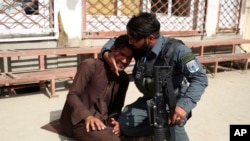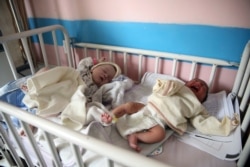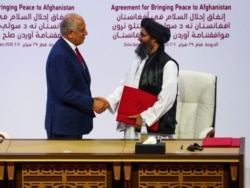The United Nations has accused Afghan warring sides of killing and injuring more than 430 noncombatants over the past six weeks, with a disregard for international law aimed at protecting civilians from harm.
A report released Tuesday by the United Nations Assistance Mission in Afghanistan (UNAMA) comes as Afghan officials and the Taliban reported renewed fighting in several provinces, with both adversaries accusing each other of harming civilians.
Afghan security forces reportedly bombed a clinic Tuesday in the troubled northern Kunduz province in the process of repelling a Taliban assault on the besieged provincial capital, also called Kunduz. The Afghan Defense Ministry said its forces killed at least 40 insurgents, forcing the Taliban to retreat, but it did not confirm the airstrike on the clinic in area.
The airstrike destroyed a portion of the clinic and there were reports of casualties. The Taliban has twice before overrun Kunduz.
Meanwhile, unknown gunmen stormed a mosque during evening prayers in northern Parwan province, killing at least eight worshipers and injuring several others. There were no claims of responsibility, and officials expected the death toll to increase.
The Afghan war has intensified with the onset of the summer fighting season, despite a landmark agreement the United States signed with the Taliban insurgency in February amid hopes that it reduces years of deadly hostilities in the country.
The UNAMA report noted that the Taliban harmed 208 civilians in April, marking a 25% increase from the same month last year. It also blamed Afghan security forces for causing 172 civilian casualties in April, saying the figures were 37% higher than the month before.
“I call for a halt to the fighting and for parties to respect humanitarian law that is there to protect civilians,” said Deborah Lyons, who heads the UNAMA. She called for urgently starting intra-Afghan peace negations.
“Parties have committed to finding a peaceful solution and should protect the lives of all Afghans and not jeopardize people's hope for an end to the war,” said Lyons.
The UNAMA also expressed concerns that there was no reduction in the levels of violence in the first half of May, saying more than 50 civilians have died so far and dozens more were injured in attacks, including those claimed by Islamic State terrorists.
Taliban spokesman Zabihullah Mujahid rejected the UNAMA findings, accusing it of “concealing” casualties that government forces and their foreign military partners have inflicted on Afghan civilians in recent days.
Reacting to the report, the Afghan government insisted that the information it has gathered from the battlefield showed “the Taliban and their aligned terrorist groups are responsible for the vast majority of the civilian casualties.”
A shocking militant gun-and-bomb raid targeted a maternity clinic in the Afghan capital, Kabul, last week, killing 24 people. More than half of them were women, including three with unborn babies, according to Doctors Without Borders, a global humanitarian group, which runs the maternity ward.
The Taliban denied involvement in the hospital attack, and no other group has claimed responsibility. But the United States blamed Islamic State for plotting the violence, saying the terrorist group is opposed to Afghan peace-building efforts.
The attack prompted Afghan President Ashraf Ghani to order security forces to resume offensive operations against the insurgents and their allies, posing a fresh challenge to the U.S.-Taliban deal.
The Feb. 29 U.S.-Taliban agreement requires U.S. and coalition forces to leave Afghanistan by mid-July 2021 in return for insurgent security assurances and pledges to engage in intra-Afghan peace talks to end the violence.
Zalmay Khalilzad, the U.S. envoy for Afghan peace who negotiated the pact, has begun a fresh trip to the region in his bid to press the Taliban and Kabul to accelerate a slow-moving prisoner swap so the two sides can move closer to opening the peace dialogue.
Washington hopes this week’s settlement of a lingering political dispute between Ghani and his chief election rival, Abdullah Abdullah, would help advance the peace process.
Both claimed to have won the September presidential election and held competing inauguration ceremonies in March, paralyzing the governance in Afghanistan and dealing a serious blow to the nascent U.S.-led peace efforts.
However, Ghani and Abdullah signed a power-sharing agreement on Sunday, ending months of political turmoil and raising hope the two would be able to present a united team to engage in peace talks with the Taliban when they begin.










